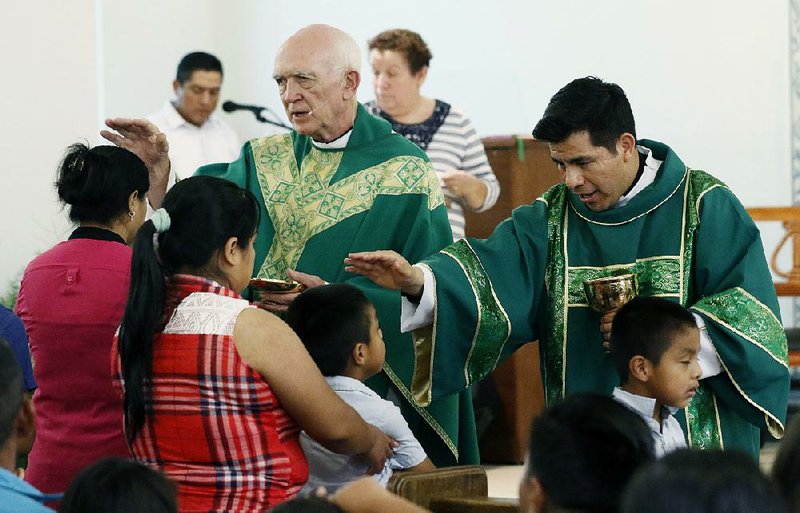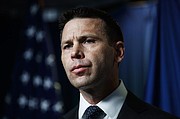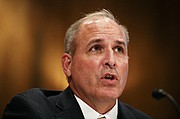WASHINGTON -- The timing of immigration raids at Mississippi food-processing plants after a mass shooting apparently targeting Hispanics in Texas was "unfortunate," the top U.S. Homeland Security official said.
Still, Kevin McAleenan, acting secretary of the Department of Homeland Security, said the actions, part of broader enforcement efforts that include employers as well as workers, had been planned for more than a year.
About 680 migrant workers were arrested Wednesday at seven facilities in the Southern state, the largest workplace raid in about a decade, U.S. authorities said.
Asked whether he wished the raids hadn't happened last week after a mass shooting the previous weekend in El Paso, Texas, in which police say the man accused of the killings said he was targeting Mexicans, McAleenan said "the timing was unfortunate."
U.S. authorities have in recent days strongly defended the raids after images of weeping children arriving home to find their parents missing emerged. The operation has also exposed what state and local officials say is a major shortcoming in U.S. Immigration and Customs Enforcement procedures for dealing with children, with parents caught up in immigration-related enforcement activities while at work unable to pick their children up from school, day care centers and elsewhere, leaving some of them deserted and scared.
Mark Morgan, the acting commissioner of U.S. Customs and Border Protection and a former acting director of Immigration and Customs Enforcement, called Wednesday's action "a criminal investigation."
"In this case, this was a joint criminal investigation with ICE and the Department of Justice targeting work site enforcement, meaning companies that knowingly and willfully hire illegal aliens so that, in most cases, they can pay them reduced wages, exploit them further for their bottom line," Morgan said on CNN's State of the Union. "That's what this investigation was about -- a criminal investigation."
Still, McAleenan said on NBC's Meet the Press that the operation "was done with sensitivity" -- with caseworkers on hand, and agents from Immigration and Customs Enforcement at local schools as liaisons.
"ICE took great pains to make sure there were no child-dependent care issues that were ignored," McAleenan said.
Both Morgan and McAleenan suggested Sunday that videos of children crying after their parents were taken away were designed to elicit sympathy from the public.
"I know it's emotional. I know it's done on purpose to show a picture like that," Morgan said about a widely circulated video of a young girl crying and begging for her father to be brought back.
Morgan added that he "understands" why the girl is upset, "but her father committed a crime." He said the girl was later reunited with her mother.
TARGETING WORKERS
Asked why the administration went after the workers and not the employers who hired them by the hundreds, McAleenan said employers were being targeted in the investigation but that more than 200 of the workers detained had criminal records.
"This is a criminal investigation of the employers who are exploiting an undocumented workforce and skirting our laws," McAleenan said. "Now, when you do an operation at a work site, you can't ignore people that are there without the proper permission to be in the United States."
McAleenan also suggested that the raids were carried out to serve as a deterrent to other potential migrants from Latin America.
"The priority, right now, is our border security crisis, the humanitarian and security crisis at the border," he said.
When it was pointed out that Mississippi is not on the border. McAleenan responded that the move was part of a "balanced enforcement strategy."
"We've got to secure the border," he said. "But we also have to have interior enforcement to stop this incentive, this work opportunity, that we have in the U.S. that employers are exploiting."
Morgan said on CNN that the raids were not "raids," disputing the terminology that has been widely used to describe the operation.
"I think words matter. These aren't raids. These are targeted law enforcement operations," Morgan said.
He added that employers, too, are being investigated. But he emphasized that the workers "aren't undocumented immigrants. They are illegal immigrants."
Asked about news reports that the Trump Organization has for years used undocumented immigrants for labor at President Donald Trump's properties -- and why there haven't been any raids in those cases -- Morgan said, "You really can't say that for sure because there are investigations going on all the time that you're unaware of."
Even so, Sen. Kamala Harris of California, a 2020 Democratic presidential hopeful, said on Meet the Press that the immigration raids were part of a "campaign of terror" by the Trump administration to make Hispanics "afraid."
Prosecuting corporations -- as opposed to workers -- for immigration-related offenses has slowed under the Trump administration, according to a database maintained by Duke University and the University of Virginia and data reviewed by The Washington Post, with only a handful of companies prosecuted for such violations since 2017.
The Immigration and Customs Enforcement raids have been criticized by other Democratic lawmakers, including Rep. Bennie Thompson of Mississippi, head of the House Homeland Security Committee. Thompson said in a statement that Immigration and Customs Enforcement seemed to have ignored internal guidelines requiring it to minimize the impact on children affected.
"The Department of Homeland Security's leadership has a responsibility to understand the consequences of its actions, and I seriously question why they continue to target migrant families in this way," Thompson said.
Illinois-based Koch Foods, operator of one of the Mississippi chicken-processing plants subject to last week's raids, will hold a job fair today to recruit new workers, the company announced on Facebook.
MARCH IN MISSISSIPPI
In Canton, Miss., on Sunday, children from Sacred Heart Catholic Church marched, carrying what they said was a message of opposition against immigration raids their parents could not.
"I will not sit in silence while my parents are taken away," read a sign carried by two Hispanic boys. They were among a group of several dozen marchers who set out on foot from the church to the town square in Canton to protest the migrant arrests.
"Imagine coming home and not finding your parents," said Dulce Basurto-Arce, an 18-year-old community college student, describing how parents of friends were arrested. "We are marching so no other kid has to go through what we went through. Let our voices be heard!"
Churches were the backbone of the civil-rights movement. Today, as Trump and Republican allies continue to defend the raids, churches have emerged as the top sources of spiritual and material support to the mostly Mexican and Guatemalan workers targeted by the raids.
Some churches are going beyond comfort and material aid, with their response flaring into political opposition. The state's Catholic, Episcopal, United Methodist and Evangelical Lutheran bishops denounced the raids in a joint statement Friday.
The bishops said they would aid the immigrant families, saying there is "an urgent and critical need at this time to avoid a worsening crisis."
"We are called ... to speak the truth. And the truth is, this is not right," said Bishop Brian Seage of the Episcopal Diocese of Mississippi, speaking at a news conference one day after the raids.
Sacred Heart has emerged as a hub of the community's response to the raid. Its pastor, the Rev. Mike O'Brien, stood with parishioners until 4 a.m. Thursday outside the Peco Foods plant in Canton, awaiting those freed from custody that night. O'Brien said he drove several people home who had hidden from federal agents inside the plant and emerged late at night.
Those arrested and released can't work legally and their families may face one last paycheck as income dries up. Immigration court dates may not be until 2020 because of a deep backlog. Those who face court proceedings must also pay for their own lawyers or go without, and may have court dates at locations hundreds of miles away.
"What are their children going to eat?" the Rev. Jason Coker, coordinator of the Cooperative Baptist Fellowship in Mississippi, asked last week.
In answer, churches including Sacred Heart are collecting food, diapers and money. They're also helping members meet lawyers.
Information for this article was contributed by Ros Krasny, Miles Weiss and Mark Niquette of Bloomberg News; by Felicia Sonmez, Tim Craig and Joshua Partlow of The Washington Post; and by Jeff Amy of The Associated Press.
A Section on 08/12/2019


